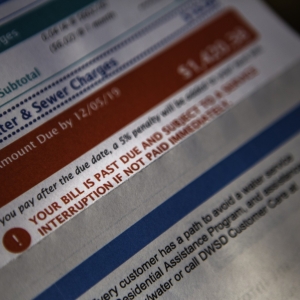The Stream, August 6, 2020: Levels in Lake Michigan, Huron Break Records Again
The Global Rundown
Water levels in Lake Michigan and Lake Huron continue to rise. Mumbai is drenched in rain. A new study explains seemingly inexplicable freshwater increases in the Arctic Ocean. An oil slick off the coast of Venezuela threatens their economy. Caribbean nations struggle to combat both Covid-19 and the upcoming hurricane season.
“In the coming days and weeks, children and families will be at risk of being hit simultaneously by two disasters, Covid-19 and hurricanes.” – Bernt Aasen, UNICEF’s regional director for Latin America and the Caribbean. Because of the global pandemic, Caribbean and Latin American nations are scrambling to update their hurricane preparedness programs. The region has already been pummeled by the novel coronavirus with more than 4.5 million confirmed cases and around 190,000 deaths. To ensure safety against extreme weather and the virus, shelters are being updated to accommodate social distancing guidelines and volunteers from local aid organizations are being trained online, although many worry that won’t be enough to protect the region from four predicted storms that could develop into major hurricanes. Reuters
Latest WaterNews from Circle of Blue
Millions of Americans Are In Water Debt – Most Americans give little thought to water bills, paying them on time and in full. But for a subset of homeowners and renters, water debt is constant and menacing.
When It Rains, Texas Forgets Drought and Worsening Water Scarcity – After the pandemic, soaring population growth, development will challenge planning and water supply.
HotSpots H2O: Tensions Rise in Horn of Africa as Ethiopia Fills Controversial Dam – The Grand Ethiopian Renaissance Dam, situated snuggly between Ethiopia, Egypt, and Sudan on the Blue Nile, has brought years of controversy to the Horn of Africa.
By The Numbers
582.20 feet The depth of Lake Michigan-Huron in July, setting another record high this summer. The lakes, which are measured together because the levels on each body move together, are expected to set records again next month before beginning to decline in September. The U.S. Army Corps of Engineers is warning property owners affected by high water levels last fall to prepare for similar or worse conditions over the next few months. Green Bay Press Gazette
In context: HotSpots H2O: U.S. Great Lakes, Near Record Highs, Pummel Coastal Infrastructure
293 mm (11.5 in) The amount of rain Mumbai has received in just four days, which is half of their monthly average for August. The weather bureau has predicted the downpour will continue until Thursday and meteorologists are warning citizens to be on high alert. The rains were predicted far in advance, which many said has given them time to prepare and take shelter. Hindustan Times
Science, Studies, and Reports
A study out of University of Colorado Boulder has shown that climate change is driving increasing amounts of freshwater into the Arctic Ocean. The paper examined how the freshwater could eventually end up in the North Atlantic Ocean and could disrupt ocean currents and affect temperatures in Northern Europe. The research showed that unlike natural increases of freshwater in the past, this can be directly attributed to climate change and may leave more permanent damage. The research team hopes that their work will be able to allow scientists to monitor upcoming changes in real time and better understand how changes in the Arctic can impact climate globally. University of Colorado Boulder
On the Radar
An oil slick appeared on the coastline of Venezuela’s western Falcon state over the weekend. The coast is known for its pristine beaches and nature preserves and environmental activists say that the slick will affect the tourism and fishing sectors. While no official comment has been made by local or national authorities, opposition lawmakers have been outspoken about the slick, which they say was most likely caused by a ship’s fuel tank. Reuters
Jane is a Communications Associate for Circle of Blue. She writes The Stream and has covered domestic and international water issues for Circle of Blue. She is a recent graduate of Grand Valley State University, where she studied Multimedia Journalism and Women, Gender and Sexuality Studies. During her time at Grand Valley, she was the host of the Community Service Learning Center podcast Be the Change. Currently based in Grand Rapids, Michigan, Jane enjoys listening to music, reading and spending time outdoors.






Leave a Reply
Want to join the discussion?Feel free to contribute!